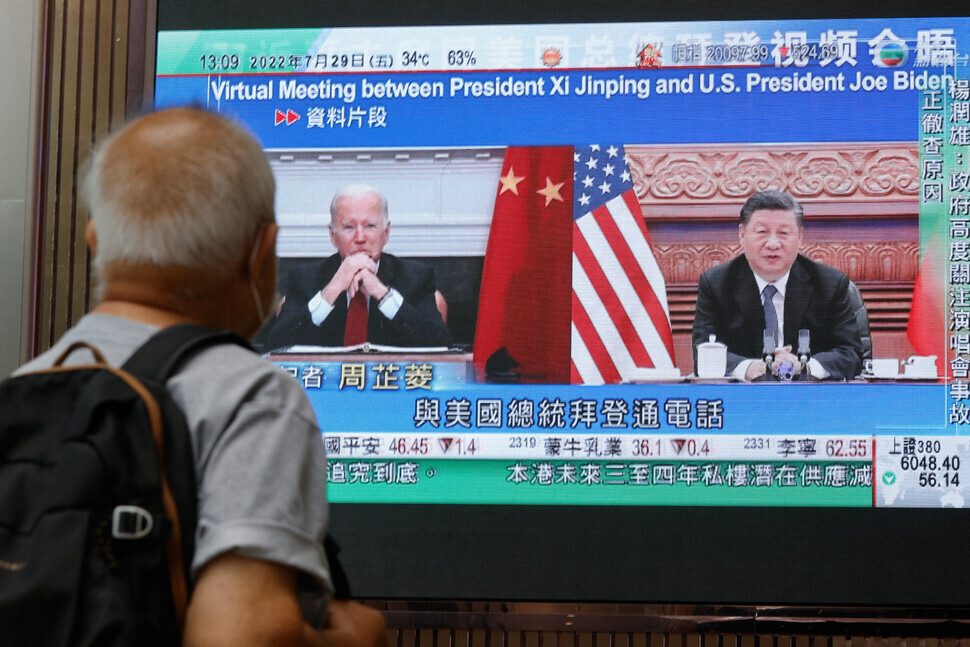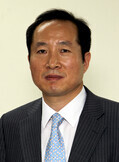hankyoreh
Links to other country sites 다른 나라 사이트 링크
[Column] A new Korea strategy for the era of US-China rivalry for hegemony


By Park Hyun, editorial writer
“Each Party shall accord national treatment to the goods of the other Party.” That text appears in Article 2 of the South Korea-US Free Trade Agreement (KORUS FTA).
That’s basically the first principle of the FTA, considering that Article 1 lays out the definitions for the agreement.
The FTA text helpfully explains that “national treatment” means “treatment no less favorable than the most favorable treatment that regional level of government accords to any like, directly competitive, or substitutable goods.” What that means is that neither Korea nor the US is supposed to discriminate against each other’s products.
But the tax credit for electric vehicles in the US Inflation Reduction Act, which took effect on Aug. 16, is a clear violation of that principle. Under this law, customers who purchase an electric vehicle that was assembled in North America (that is, the US, Mexico or Canada) will receive a tax credit worth as much as US$7,500 (around KRW 10 million).
Since this tax credit is available from the day the law takes effect, electric vehicles made in Korea are immediately placed at a disadvantage. It’s also a violation of the World Trade Organization’s (WTO) “most favored nation” principle, under which benefits provided to one country must also be provided to other countries.
The US is morphing from a guardian of free trade into a disrupter of international trade norms. That illustrates the cold reality of geopolitics, in which the US, despite being the leader of today’s international trade order, is perfectly willing to dispense with those principles when they no longer seem to serve its national interest.
The CHIPS and Science Act, which took effect on Aug. 9, includes a provision that prohibits semiconductor manufacturers around the world that receive subsidies from the US government from building new cutting-edge factories in China or expanding existing factories. And now the US is extending those restrictions to the automobile industry.
That’s probably because the US has concluded it can no longer prevail under the current conditions now that China is beginning to dominate the future ecosystem of the automobile industry, including electric vehicles and batteries.
The problem is that the US and China’s rivalry is causing collateral damage for Korea. While Hyundai and Kia carved out the second-largest share of the US electric vehicle market this year, the new tax credit places them at a serious disadvantage in terms of price competitiveness.
And since the semiconductor industry is always in flux, Samsung Electronics and SK Hynix may become less competitive if they aren’t able to expand their manufacturing capacity in China at the right time.
Since his inauguration, Korean President Yoon Suk-yeol has basically gone “all in” on the Korea-US alliance. He has even bragged about the two countries’ relationship being upgraded to an “economic security alliance.” But the US’ decision reveals that the current administration’s US policy is merely a mirage.
The Yoon administration’s China policy is troubling as well. During his campaign for president, Yoon pledged on Facebook to allow the US to deploy more batteries of its THAAD missile defense system. But early this month, China pressured Korea with “three noes” and “one restriction.”
Moon Jae-in went to great trouble to stitch up the gaping wound left by Park Geun-hye’s rash decision to OK the THAAD deployment, but the current government seems to be looking for trouble. The THAAD issue is basically another example of collateral damage from the US and China’s struggle for hegemony.
Korea’s position nowadays is akin to the shrimp in the old proverb — the one that gets crushed in a brawl between whales. Given its strategic position at the juncture between maritime and continental powers, the Korean Peninsula is fated to be an arena of competition between the great powers.
Some people have even compared Korea’s current predicament to that of Joseon during its final years before being annexed by Japan. But it’s only when we recognize that today’s situation is completely different from in the past that we can find the right answer.
Crucially, Korea was powerless then, but not now. Korea has leverage that neither the US nor China can ignore in high-tech industries, including semiconductors. It was remarkable for Koreans to witness the president of the US — the world’s most powerful country — requesting technical cooperation during a visit to a Korean chipmaking factory. Also unusual was China asking Korea to play the role of a “mediator” in the US’ push for the Chip 4 consultative group on the semiconductor supply chain.
In 1880, while Joseon was maintaining its closed-door policy, a Qing Dynasty diplomat named Huang Zunxian recommended in his book “Korea Strategy” that Joseon be “close to China, wedded to Japan, and linked to the US” to prevent Russia from moving south onto the Korean Peninsula. Huang was suggesting that Korea create a balance of power between Korea’s powerful neighbors.
While that sounded like a plausible strategy, subsequent history showed that Korea, given its weakness, was doomed to become a victim of those powerful countries.
Today we’re in urgent need of a “new Korea strategy” that takes into account our elevated status and the new Cold War between the US and China. That strategy should be based on three pillars.
First, Korea must not become estranged from any major power. Huang might have put that as being “linked to the US, friendly with China, and in contact with Japan.”
Second, as an open commercial state, Korea needs to ask both the US and China to maintain commercial norms while seeking to separate economic issues and security ones.
Korea is not the only country that fears that a clash between the US and China would lead to an economic rupture with China. The reality is that China is the number one trading partner for 60 countries in the world. An economic rupture with China would also be undesirable for the many companies and banks in the US — including Apple — that do business in China.
Korea needs to partner with those countries, as well as American companies, to create a buffer between the US and China.
In his book “The United States vs. China: The Quest for Global Economic Leadership,” C. Fred Bergsten, an influential economic advisor in Washington and director emeritus of the Peterson Institute for International Economics, wrote that the US and China should decouple economic issues from sensitive security issues, rather than decoupling their economies. Bergsten said that strategy has the support of key American allies, including Germany.
Third, Korea needs to take a leading role in building a system for peace in East Asia. Just as European countries established the Organization for Security and Co-operation in Europe to ease conflict and achieve coexistence during the Cold War, an organization for security cooperation can also be erected in East Asia.
Considering that Korea might be entangled in a sharp conflict between the US and China during a crisis in the Taiwan Strait, a regional body for security cooperation is needed to prevent such a crisis from escalating into a catastrophe.
If Korea remains passive, it could once again become the victim of the great powers. Korea needs to get over its “small country” mentality and adopt an active posture.
But that may be beyond the capabilities of the Yoon administration. With Yoon making a mess of domestic policy, there’s little hope that he can employ advanced diplomatic techniques in his foreign policy. In the end, civil society will have to step up to the plate.
Please direct questions or comments to [english@hani.co.kr]

Editorial・opinion
![[Column] Season 2 of special prosecutor probe may be coming to Korea soon [Column] Season 2 of special prosecutor probe may be coming to Korea soon](https://flexible.img.hani.co.kr/flexible/normal/500/300/imgdb/original/2024/0426/3317141030699447.jpg) [Column] Season 2 of special prosecutor probe may be coming to Korea soon
[Column] Season 2 of special prosecutor probe may be coming to Korea soon![[Column] Park Geun-hye déjà vu in Yoon Suk-yeol [Column] Park Geun-hye déjà vu in Yoon Suk-yeol](https://flexible.img.hani.co.kr/flexible/normal/500/300/imgdb/original/2024/0424/651713945113788.jpg) [Column] Park Geun-hye déjà vu in Yoon Suk-yeol
[Column] Park Geun-hye déjà vu in Yoon Suk-yeol- [Editorial] New weight of N. Korea’s nuclear threats makes dialogue all the more urgent
- [Guest essay] The real reason Korea’s new right wants to dub Rhee a founding father
- [Column] ‘Choson’: Is it time we start referring to N. Korea in its own terms?
- [Editorial] Japan’s rewriting of history with Korea has gone too far
- [Column] The president’s questionable capacity for dialogue
- [Column] Are chaebol firms just pizza pies for families to divvy up as they please?
- [Column] Has Korea, too, crossed the Rubicon on China?
- [Correspondent’s column] In Japan’s alliance with US, echoes of its past alliances with UK
Most viewed articles
- 1‘We must say no’: Seoul defense chief on Korean, USFK involvement in hypothetical Taiwan crisis
- 2Why Kim Jong-un is scrapping the term ‘Day of the Sun’ and toning down fanfare for predecessors
- 3Two factors that’ll decide if Korea’s economy keeps on its upward trend
- 4BTS says it wants to continue to “speak out against anti-Asian hate”
- 5After election rout, Yoon’s left with 3 choices for dealing with the opposition
- 6Gangnam murderer says he killed “because women have always ignored me”
- 7South Korea officially an aged society just 17 years after becoming aging society
- 8Noting shared ‘values,’ Korea hints at passport-free travel with Japan
- 9Ethnic Koreans in Japan's Utoro village wait for Seoul's help
- 10US citizens send letter demanding punishment of LKP members who deny Gwangju Massacre